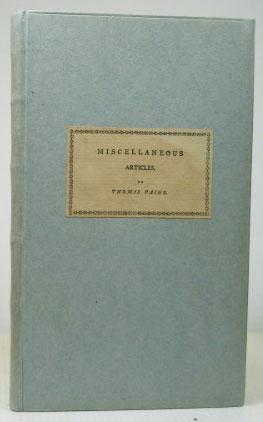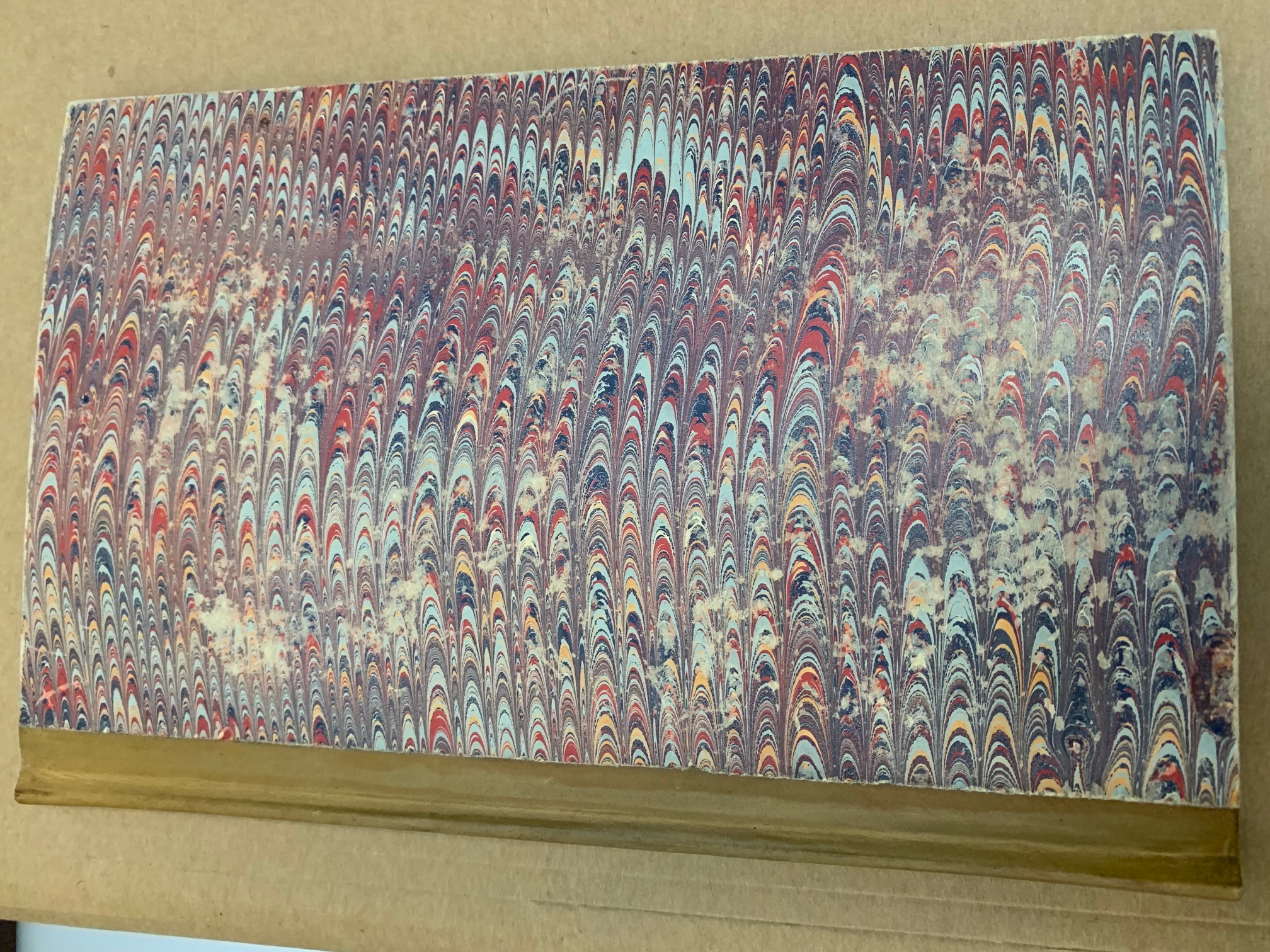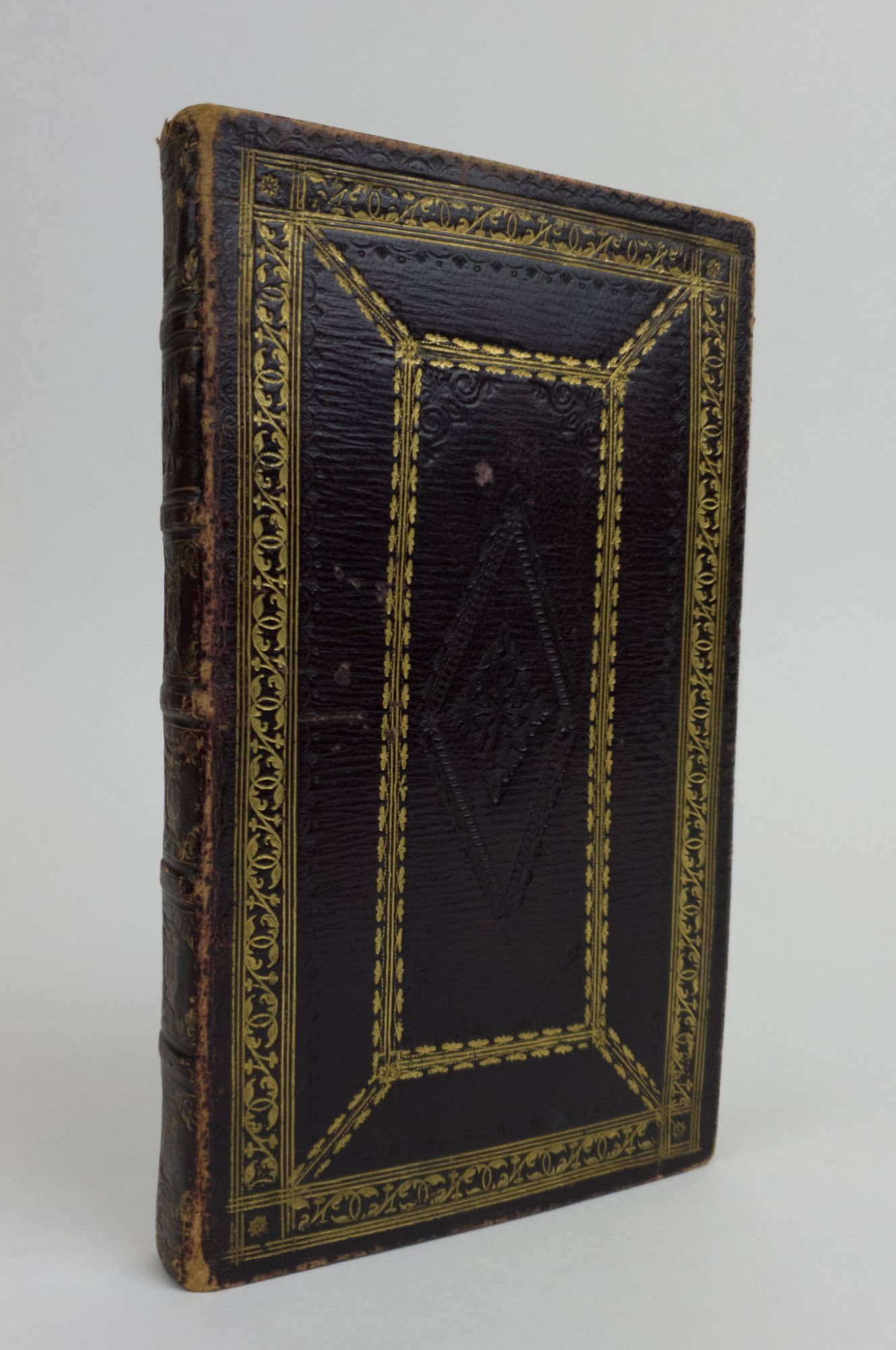Available Copies from Independent Booksellers

Price: US$192.41 + shipping
Description: hardback, 8vo, 36,(1)pp, pages browning and scattered foxing, otherwise clean and tight, no markings or inscriptions, rebound with new endpapers in plain pale blue paper-covered boards, Very Good condition
Seller: BRIMSTONES, Lewes, United Kingdom

Price: US$220.00 + shipping
Condition: Very Good
Description: 7.25 x 4", removed from bound volume, 36pp with publisher's ads, pp toned and spotted, some edge-wear, some separation of binding else a nicely preserved copy of the FIRST EDITION.
Seller: John K King Used & Rare Books, Detroit, MI, U.S.A.

Paine, Thomas. Miscellaneous Articles. J. Ridgway, London, 1792.
Price: US$250.00 + shipping
Condition: Very Good
Description: Consisting of A Letter to the Marquis of Lansdowne; A Letter to the Authors of the Republican; A Letter to the Abbe Syeyes; Thoughts on the Peace, and the Probable Advantages Thereof; First Letter to Mr. Secretary Dundas; Letter to Lord Onslow; Second Letter to Mr. Dundas; and A Letter to the People of France. Ridgway published a second edtion of this work in 1793. Unbound as issued, 33 pages with 3 pages of ads. Saddle stitched vertically into a single fold marbled sheet. [Loc.:E 320]
Seller: ReREAD Books & Bindery, Little Rock, AR, U.S.A.

PAINE, Thomas [1737-1809].. Miscellaneous Articles. London: Printed for J.Ridgway, 1792., 1792.
Price: US$277.00 + shipping
Description: 8vo. pp. 36. disbound. Including A Letter To The Marquis Of Lansdowne, A Letter To The Authors Of The Republican, A Letter To The Abbé Syeyès, Thoughts on the Peace , First and Second Letters to Mr. Dundas, Letter to Lord Onslow, and A Letter to the People of France. Thetford Collection 213.
Seller: D & E LAKE LTD. (ABAC/ILAB), Toronto, ON, Canada

Price: US$282.21 + shipping
Description: 12mo (in 6s), pp. 46 [47 - 48 adverts for H. D. Symonds imprints], disbound. First published in 1782, in English as well as French, Paine's pamphlet explaining and defending the American Revolution went into many editions.
Seller: John Price Antiquarian Books, ABA, ILAB, LONDON, United Kingdom

Price: US$288.62 + shipping
Description: Three works bound in one, "Miscellaneous Articles" first edition, 33, (3 advertisement), 36, 40 pp. Some light browning and minor tears, one corner torn away without loss. 20th century boards. "Miscellaneous Articles" collects 8 pieces; letters to the Marquis of Lansdowne, the Authors of the Republican, Abbé Syeyes, Lord Onslow the people of France and two to Henry Dundas as well as his "Thoughts on the Peace". "A Letter to Abbé Raynal" first appeared in 1782 and remains one of Paine's most important works, disputing an earlier account of the American revolution, and indeed the definition of "revolution" itself. The "Letter to the Addressers." concerns the government's warning against "wicked and seditious libels" in May 1792, directed chiefly at the second part of "The Rights of Man" and follows on from his letters to Dundas and Onslow. This response was at the printers even as he fled the country in September of the same year. Gimbel pp. 83, 72, 74. Sabin 58222 notes similar editions of "Abbé Raynal"
Seller: Bow Windows Bookshop (ABA, ILAB), Lewes, United Kingdom

Price: US$810.00 + shipping
Condition: Near Fine
Description: Thomas Paine, Letter to the Abbé Raynal on the Affairs of North-America in which the Mistakes in the Abbe s Account of the Revolution of America are Corrected and Cleared up, London: J. Ridgway 1792 This work was written during 1782 to rebut French historian Raynal s 1780 analysis of the cause and want of significance of the American Revolution. Thomas Paine argued that the cause went far beyond objections to being taxed by the British and contended that the colonists rebellion was revolutionary in that they had irreversibly altered both the structure of government and the popular perceptions of the legitimacy of state power. This letter marked the expansion of Paine s thinking to include the establishment of international free trade and the need for worldwide peace. Paine valued this fruit of his pen so highly that he sent 50 copies to George Washington. This iteration has a postscript. Guillaume Thomas Francois Raynal, abbé de Raynal (1713-1796), was a French writer and man of letters during the Age of Enlightenment. (Wikipedia.) As a propagandist he helped set the intellectual climate for the French Revolution. On January 10, 1776, a month before he turned 39, Paine exploded onto the transatlantic stage as the foremost advocate of obtaining liberty for the colonies by fighting the British. Paine himself commented that any literary talent he might have had was buried in me and might ever have continued so, had not the necessity of the times dragged and driven him to write. (The Crisis, No. VIII, ¶6.) Historians credit Paine s 1776 publication of Common Sense, which he allowed others to reprint, with galvanizing public opinion for independence which led to the Declaration of Independence, the Revolutionary War, and the United States becoming an independent non-monarchical nation. Paine s importance to the cause was cemented by the first issue of The Crisis which George Washington had read aloud to the army he commanded. Without Paine s pen, the war might well have been lost almost as soon as it began. As the author of Common Sense (1776), Rights of Man (1791, 1792), Age of Reason (1794), and The [American] Crisis (1776-1783), Paine was far ahead of his times as a political and economic thinker and essayist. After 1782, Paine was known to introduce himself as the author of Common Sense and this Letter. This volume has a pink with red droplets modern hard cover binding. All pages are intact, clean, and no one has written upon them. The print is small.
Seller: Paines Pen, Guerneville, CA, U.S.A.

Thomas Paine. Two Letters to Lord Onslow. James Ridgway, 1792.
Price: US$1170.00 + shipping
Condition: Very Good
Description: PAINE, Thomas. Two Letters to Lord Onslow, Lord Lieutenant of the County of Surry [sic]: and one to Mr. Henry Dundas, Secretary of State, on the Subject of the late Excellent Proclamation. London: James Ridgway, 1792. Third edition, 8vo, 36 pages plus four pages of advertisements. The first and last pages have some soiling. 20th century quarter calf, marbled binding. Henry Dundas was Home Secretary in William Pitt the Younger s government, which in May 1792 issued a proclamation against "wicked and seditious writings" and summoned Paine to appear in court for publishing the second part of The Rights of Man. Paine angrily expanded his arguments, comparing the British and American systems of government, and signed off, "I am, Mr. Dundas, Not your obedient humble Servant, But the contrary, THOMAS PAINE." Lord Onslow held a public meeting to celebrate the proclamation but there, after receiving and reviewing Paine's first letter, labeled Paine "the common enemy of us all". Paine, who was one of the first and fiercest proponents of what we now call the welfare state, doubly accepted that label, writing in his second letter to Onslow: you spoke one of the greatest truths you ever uttered, if you confine the expression to men of the same description with yourself; men living in indolence and luxury, on the spoil and labours of the Public". (At pp. 31-32.) And later by concluding, that the next time you call me a public enemy, you would add, of us sinecure Placemen and Pensioners. (At p. 36.) As the author of Common Sense (1776), Rights of Man (1791), Age of Reason (1794), and The [American] Crisis (1776-1783), Paine was far ahead of his times as a political and economic thinker and essayist. Having left school when he was 12, Thomas Paine, the son of a corset maker trained to take-up that occupation, revealed no genius as he went from job to job. But on January 10, 1776, a month before he turned 39, Paine exploded onto the transatlantic stage as the foremost advocate of obtaining liberty for the colonies by fighting the British. Paine himself commented that any literary talent he might have had was buried in me and might ever have continued so, had not the necessity of the times dragged and driven him to write. (The Crisis, No. VIII, ¶6.)
Seller: Paines Pen, Guerneville, CA, U.S.A.

Price: US$3300.00 + shipping
Description: Octavo, iv, 78 pages, vii, [1], pp. [9]-90, [4], [4], pp. [5]-45. In Very Good condition. Bound in full unsigned straight-grained morocco, elaborate gilt dicing to boards, paneled spine with gilt titling and tooling. All edges gilt. Boards show some wear and rubbing, primarily to extremities and hinges, small bump to tail of spine, and minor rubbing and scraping to binding; Text block (all edges gilt) has archival backing to the title page of Rights of Man, and archival backing to title pages of Part the Second and Abbe Raynal, and generally more wear to title pages than the remaining text block. Abbe Raynal lacks the final advertisement leaf. Bound in at the rear is a large bound-in advertisement for Astley's Royal Amphitheatre, dated September 11, 1815. Approximately 20 in. x 6.5 in., printed on both sides. With numerous fonts and old folds. Trimmed, with small loss to text. EC Consignment. Shelved in Case 3. Contains three early printings of Thomas Paine as well as a large bound-in advertisement, dated September 11, 1815. Rights of Man first appeared in 1791 as a response to Edmund Burke's criticism of the French Revolution. It quickly went through multiple editions in its first year, and it is estimated that within three months of its release over 50,000 copies were in circulation. Paine is credited with helping (temporarily) turn the tide of public opinion regarding the revolution in France. It was for this work that he was tried and convicted in absentia for seditious libel - the sentence for which he avoided, as he was in France. A crucial document both of the revolutionary period and the radical enlightenment. References: ESTC T5878; ESTC T5879; ESTC T5834. The advertisement is for a Hippodrama featuring equestrian events intermixed with comedy and drama, and took place at Astley's Amphitheatre, the first modern circus ring. Featured on the ad are both Mr. Ridgway, as "Fim Turf (Afterwards Harlequin)" and Mrs. Ridgway, featured in larger font as Joan in Henry VIII and the Cobler. They are of possible relation to James Ridgway, who published one of the included Paine pieces, if he had children or cousins involved in entertainment. It has a fascinating disparate parity, showing the political turmoil of the time with the ephemeral nature of a horse-show, "or, Harlequin in Horseback!" Since the back of the advertisement has verses based on Dibdin as well as featuring "Two High-Dressed Managed Horses will Dance Hayden's Minuet," it brings a third musical dynamic to it. Interestingly, the last part (Abbe Raynal) is lacking the final issued advertisement leaf. 1357594. Shelved Dupont Bookstore.
Seller: Second Story Books, ABAA, Rockville, MD, U.S.A.